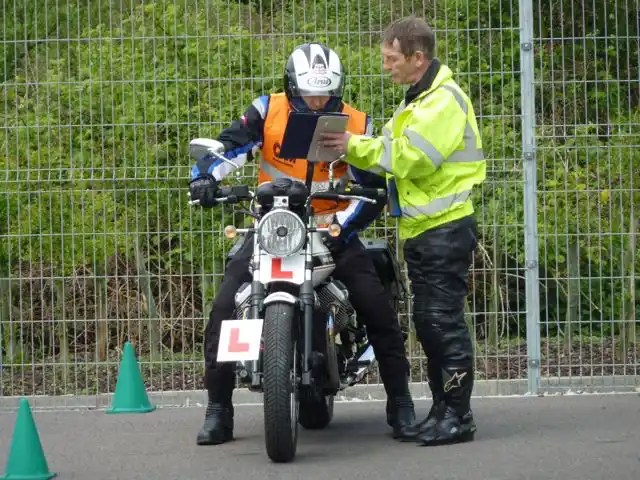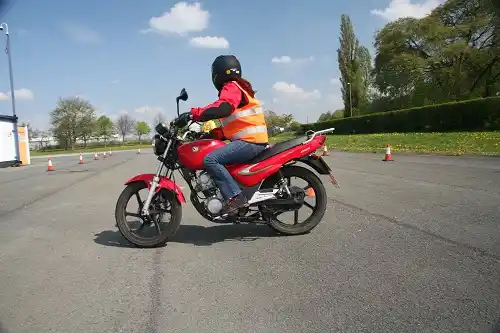Book motorcycle training in Dumfries, Dumfries and Galloway with any of the companies listed here
Click on any of the motorcycle training schools below to view more information and check availability.
A2B Motorcycle Training WL Livingston
Unit 9, Centrex House, Simpson Place, Kirkton Campus, Livingston, West Lothian, EH54 7FN
Approx. distance: 56.3 miles
Harleys Rider Training Glasgow
2 Glenburn Road, East Kilbride, Strathclyde, G74 5BA
Approx. distance: 54 miles
Lowland Motorcycle Training Dumfries
Unit 130, Heathhall Industrial Estate, Tinwald Downs Road, Heathhall, Dumfries, Dumfries and Galloway, DG1 3PH
Approx. distance: 2.2 miles
Cumbria Motorcycle Training Workington
Moorclose Community Centre, Needham Drive, Workington, Cumbria, CA14 3SE
Approx. distance: 30.8 miles
TNT Rider Newton Stewart
New Galloway Road, Newton Stewart, Dumfries and Galloway, DG8 6AW
Approx. distance: 35.5 miles
Adventures on Wheels Ltd Selkirk
Unit 1A, Gibson Buildings, Central Riverside Industrial Estate, Dunsdale Road, Selkirk, Scottish Borders, TD7 5EB
Approx. distance: 45.1 miles
Pegasus Bike Training Ayr
Bookers Cash & Carry Park, Ayr, Strathclyde, KA8 9DJ
Approx. distance: 48.6 miles
Fastrak Motorcycle Training Ayr
18 North Harbour Street, Ayr, South Ayrshire Council, KA8 8AA
Approx. distance: 49.1 miles
Lothian Motorcycle Training Bathgate
14e Blackburn Road, Bathgate, Lothian, EH48 2EY
Approx. distance: 56.3 miles
Northern Route Kendal
25, Lake District Business Park, Kendal, Cumbria, LA9 6NH
Approx. distance: 61.2 miles

BookCBTNow - Book motorcycle training in Dumfries, Dumfries and Galloway
Do you need motorcycle training in Dumfries or nearby in Newbridge Drive, Lochmaben and Lockerbie? Then you have come to the right place. Here at Book CBT Now, we can provide some of the best companies for you to get the training you need. We have many years of experience in this field and have become one of the most trusted sources of online booking for motorcycle training companies.
What are the different types of motorcycle licence I can get in Dumfries?
There are 4 main types of full motorcycle licence issued by the DVSA. The first three (AM, A1 and A2 motorcycle licences) have restrictions on the type of moped or motorcycle you can ride, the fourth (the full A motorcycle licence) has no restrictions.
The AM restricted moped licence
The A1 restricted motorcycle licence
The minimum age to take this test is 17. According to the DVSA website it will allow you to ride a "Light motorcycle up to 11 kW (and a power-to-weight ratio not more than 0.1 kW per kg) and 125 cc". This means it's up to a 125 cc motorcycle with some restrictions to make sure it cannot accelerate too fast - a really good idea when you are new to riding a motorbike!
Requirements to take the A1 motorcycle test - You must have a UK provisional or full driving licence, a valid theory test certificate and a valid CBT certificate. Once you have taken this test you will not have to keep renewing your CBT certificate every 2 years, you can ride on motorways and you can take a pillion passenger on the back of your motorbike.
The A2 restricted motorcycle licence
For this licence you need to be at least 19 years of age, have completed your CBT or have had an A1 licence for at least 2 years. As with the A1 test you also need to have a UK provisional or full driving licence and a valid theory test certificate . The main benefit of getting an A2 licence is you can ride a more powerful motorcycle. The law states a "standard motorcycle up to 35 kW (and a power-to-weight ratio not more than 0.2 kW per kg)". So it's a more powerful bike, but still not completely un-restricted. To find A2 legal motorbikes you are best visiting your local motorcycle dealer and asking them to show you the A2 legal bikes, as otherwise it's very difficult to work out just looking at the tech specs.
The full A motorcycle licence, or DAS licence.
This is the licence that allows you to ride almost any motorcycle without restrictions, so it's the ultimate motorcycle licence. No limits on power outputs or power per kg or engine size! It is also called a 'DAS' licence as it can be obtained from the 'Direct AccesS' route. There are two ways you can get this licence:
1) If you are 24 or over you can take the tests for an A licence. You must also have a UK provisional or full driving licence, a valid theory test certificate and a valid CBT certificate.
2) If you are at least 21 years of age and you have held an A2 category licence for at least 2 years. This is sometimes referred to as the 'progressive access' route as you progress from one licence to another.
When taking the test the biggest difference is that you have to use a bigger, more powerful motorcycle. It will have a power of at least 40kw and an engine cc of at least 595 cc. Your local training school will make sure you have the right size bike for your test.
There is also a flowchart (click here) that the DVLA have produced that shows these different licences and how to obtain them.
To get more detailed guidance on what licence is right for you then talk to your local motorcycle training school. You can search for them here and they are qualified to speak to you on the right type of training for you.
What is the Enhanced Rider Scheme (ERS)?
This scheme was devised by the DVSA and the motorcycle industry. The ERS course is run by many motorcycle training companies around the UK. It is for anyone who has a full motorcycle licence and wishes to check their safe riding skills. Not only will it make you a better rider but some insurance companies offer cheaper motorcycle insurance if you have been issued with a DVSA Certificate Of Competence. You will receive this certificate at the end of your ERS course if the instructor deems you to be a safe rider. If the instructor feels you need additional training it may be given on the day, or if it is felt you need a larger amount of training then you may need to come back on another day. Although ERS is not a test it is much like a CBT: provided you demonstrate a safe level of riding and knowledge during the day then you will be issued with your certificate.
The DVSA has produced a short video showing what the Enhanced Rider Scheme is all about:
Click here to watch DVSA video

If I have a full car driving licence what motorcycle can I ride?
This depends on when you passed your driving test:
If you passed your car driving test before 1st February 2001
In this case you can ride a moped up to 50 cc without Learner plates and without needing a CBT. If you want to ride anything bigger then you will need to get your CBT certificate. Then you will be able to ride a restricted motorcycle up to 125 cc with Learner plates displayed.
If you passed your driving test on or after 1st February 2001
You must obtain a CBT certificate before you can ride anything. Once completed you can ride a moped or restricted motorcycle up to 125 cc.
When can I take a pillion passenger on the back of my motorcycle?
In order to carry someone on the back of your motorbike you need to have a full motorcycle licence. This means one of the AM, A1, A2 or full A (also known as DAS) licences. This means that you cannot carry a pillion passenger if you only have a provisional licence, even if you have done a CBT. A CBT is not enough for you to take a pillion under any circumstances.
Even when you have passed your full motorcycle test you will need to make sure your motorcycle is properly equipped to take a pillion. As the rider you are legally responsible for your passenger, so it is very much in your interests to make sure your motorcycle is properly equipped. This means making sure there is a proper seat with foot rests and grab rail to hold on to. Your passenger must also wear a safety helmet (as well as all the other protective clothing!). Don't forget also that riding a motorcycle with a pillion is quite different than riding solo, so read up about the changes you need to make to your motorbike and riding style before attempting to take a pillion passenger.